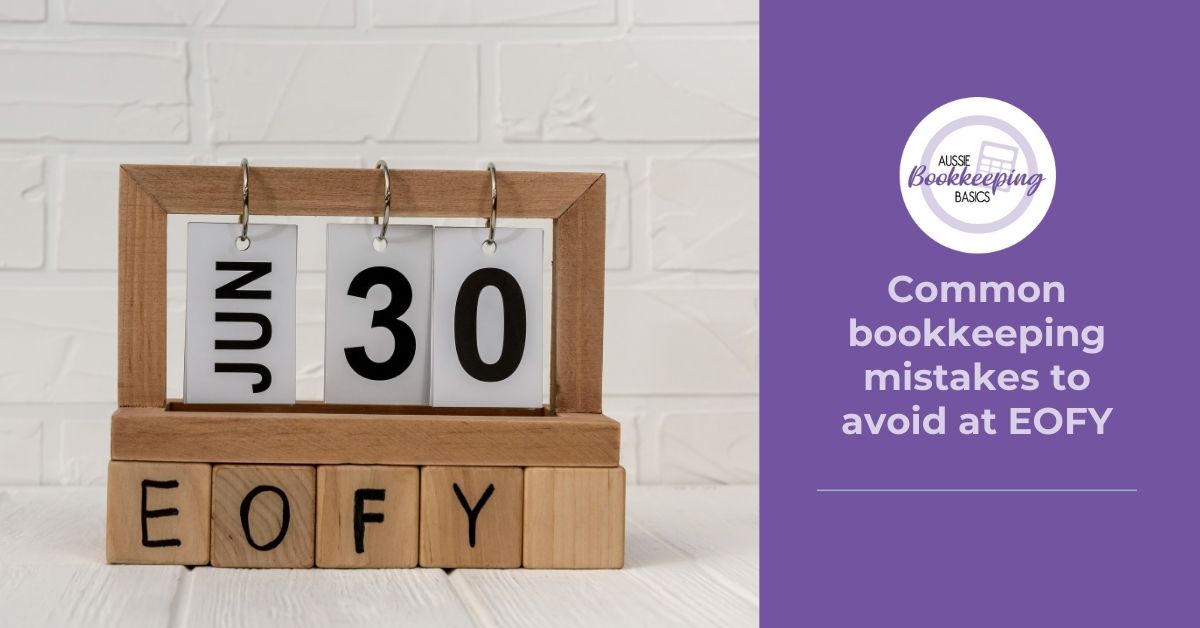The End of Financial Year (EOFY) is upon us — and if you’re a small business owner doing your own books, now is the time to make sure that you have your records in order. Rushing at the last minute or making avoidable errors can cost you time, money, and a whole lot of stress.
Here are some of the most common bookkeeping mistakes I see all the time — and how you can avoid them before EOFY hits.
1. Mixing Business and Personal Expenses
It’s an easy trap to fall into — especially if you’re just starting out. But using your personal bank account or credit card for business transactions (or vice versa) makes it harder to track deductible expenses, prepare reports, or survive an audit.
Tip: Open a dedicated business account and use it consistently. If you accidentally mix things up, note it clearly and separate it in your books.
2. Not Keeping Receipts
Yes, even in the digital age, you need to keep your receipts! The ATO expects you to have evidence for business expenses. If you’re ever audited, a missing receipt could mean a denied deduction. The ATO will accept digital copies of receipts, though, so no need to file physical receipts – storing them digitally is all you need!
Tip: Use an app or cloud storage system to snap and store receipts as you go. It takes seconds — and saves a lot of headaches later.
3. Forgetting to Reconcile
Reconciling means checking that your bookkeeping records match your actual bank account statement. If you skip this step, you may miss duplicate entries, missing transactions, or bank errors.
Tip: Reconcile your bank and credit card accounts to the bank statements (NOT a transaction listing) at least monthly — more often if you’re doing lots of transactions.
4. Not Tracking GST Properly
If you’re registered for GST, your bookkeeping needs to reflect this. Many small businesses either forget to include GST on invoices or incorrectly claim it on expenses. This can be particularly tricky in industries where some but not all income and expenses include GST, like hospitality.
Tip: Make sure your invoicing software is set up correctly. If you’re unsure whether something includes GST, it’s time to brush up — or ask for help.
5. Procrastinating
Delaying your bookkeeping until the end of the quarter (or worse — the end of the financial year!) is a recipe for mistakes, missed deductions, and late-night panic before tax deadlines.
Tip: Make bookkeeping part of your weekly or fortnightly routine. You’ll thank yourself later.
6. DIY-ing Without Learning the Basics
If you’re doing your own books, you need to understand the foundations. Guesswork and Google can only get you so far — especially when it comes to things like asset purchases, GST, payroll, or end-of-year adjustments.
Tip: If you’re ready to get confident with your bookkeeping, check out my Aussie Bookkeeping Basics course. It’s designed for Australian small business owners who want to save money and stress by doing their books the right way. You’ll learn what really matters (and skip the fluff) so you can take control of your finances with confidence.
A Final Word
Getting your bookkeeping right before tax season isn’t just about keeping the ATO happy — it’s about running a better business. You’ll be able to see how you’re really tracking, make smarter decisions, and (bonus!) sleep better at night.
Need a nudge to get started? Set aside 30 minutes this week to review your books, tidy up your records, and get ahead of the rush. Your future self will be cheering you on!




